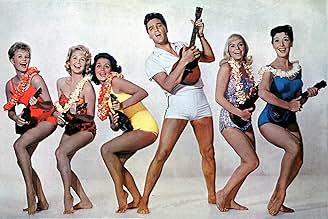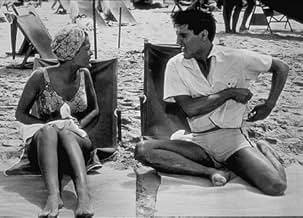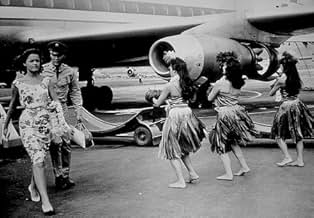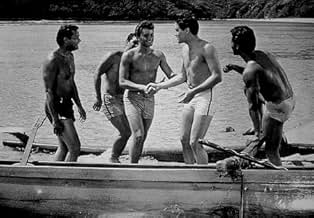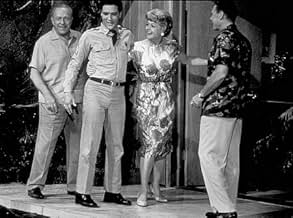VALUTAZIONE IMDb
6,1/10
7999
LA TUA VALUTAZIONE
Aggiungi una trama nella tua linguaAfter arriving back in Hawaii from the Army, Chad Gates defies his parents' wishes for him to work at the family business and instead goes to work as a tour guide at his girlfriend's agency.After arriving back in Hawaii from the Army, Chad Gates defies his parents' wishes for him to work at the family business and instead goes to work as a tour guide at his girlfriend's agency.After arriving back in Hawaii from the Army, Chad Gates defies his parents' wishes for him to work at the family business and instead goes to work as a tour guide at his girlfriend's agency.
- Premi
- 1 vittoria e 3 candidature totali
Pamela Austin
- Selena (Sandy) Emerson
- (as Pamela Kirk)
Ralph Hanalei
- Ping Pong
- (as Tiki Hanalei)
Recensioni in evidenza
This is one of his all time best movies. The plot is great and so is the scenery. Young man who wants to make it oh his own. This movie also has a strong supporting cast with the lat Howard McNear, Joan Blackman playing opposit Elvis and the heralded Angela Lansbury. This was his best musical and second only to Charro! as his best. Unfortunately this movie and GI Blues (both good movies) were so successful that this became the formula.
Elvis Presley was a hugely influential performer with one of the most distinctive singing voices of anybody. He embarked on a film career consisting of 33 films from 1956 to 1969, films that did well at the box-office but mostly panned critically (especially his later films) and while he was a highly charismatic performer he was never considered a great actor.
While not one of the top three Elvis films, those being 'King Creole', 'Flaming Star' and 'Jailhouse Rock', 'Blue Hawaii' is one of his better overall films. It's proof that his early films were actually pretty good, but unfortunately it was one of his last good ones when the formula started here wore increasingly thin and further suffered from looking less appealing and even the quality of the soundtracks and Elvis' acting wavering significantly.
'Blue Hawaii' could have been better. The formulaic story has occasional draggy spots due to the content not quite being enough to sustain the running time. While most of the soundtrack is great, there is a big difference between the best songs and the weakest, with a couple of songs that don't feel necessary, feel thrown in for the sake of it and are neither catchy or beautiful, particularly "Ito Eats" and "Splicin' Sand". The supporting cast is variable, annoying Jenny Maxwell and dull John Archer coming off worst.
However, Elvis looks natural and is very charismatic, as well as vocally and performance-wise being very much in prime. Personally thought Joan Blackman was appealing, likewise with her chemistry with Elvis, but Roland Winters and particularly Angela Lansbury fare best in support.
Visually, 'Blue Hawaii' is one of the most beautiful-looking Elvis films, along with 'King Creole' and 'Flaming Star'. It's beautifully shot and Hawaii entrances more than it ever has on film. Norman Taurog directs assuredly in by far one of his better outings with Elvis (there were 9 and the first two, the other two being 'GI Blues', are the best).
Most of the soundtrack is simply great, the highlight being the sublime "Can't Help Falling in Love", one of Elvis' most famous songs and it is impossible to not understand why. "No More", "Rock-a-Hula Baby", "Hawaiian Sunset" and "Hawaiian Wedding Song" are honourable mentions. The script is witty and there is enough of the story that amuses and charms.
In conclusion, good Elvis film, one of his better ones without being among his very best. 7/10 Bethany Cox
While not one of the top three Elvis films, those being 'King Creole', 'Flaming Star' and 'Jailhouse Rock', 'Blue Hawaii' is one of his better overall films. It's proof that his early films were actually pretty good, but unfortunately it was one of his last good ones when the formula started here wore increasingly thin and further suffered from looking less appealing and even the quality of the soundtracks and Elvis' acting wavering significantly.
'Blue Hawaii' could have been better. The formulaic story has occasional draggy spots due to the content not quite being enough to sustain the running time. While most of the soundtrack is great, there is a big difference between the best songs and the weakest, with a couple of songs that don't feel necessary, feel thrown in for the sake of it and are neither catchy or beautiful, particularly "Ito Eats" and "Splicin' Sand". The supporting cast is variable, annoying Jenny Maxwell and dull John Archer coming off worst.
However, Elvis looks natural and is very charismatic, as well as vocally and performance-wise being very much in prime. Personally thought Joan Blackman was appealing, likewise with her chemistry with Elvis, but Roland Winters and particularly Angela Lansbury fare best in support.
Visually, 'Blue Hawaii' is one of the most beautiful-looking Elvis films, along with 'King Creole' and 'Flaming Star'. It's beautifully shot and Hawaii entrances more than it ever has on film. Norman Taurog directs assuredly in by far one of his better outings with Elvis (there were 9 and the first two, the other two being 'GI Blues', are the best).
Most of the soundtrack is simply great, the highlight being the sublime "Can't Help Falling in Love", one of Elvis' most famous songs and it is impossible to not understand why. "No More", "Rock-a-Hula Baby", "Hawaiian Sunset" and "Hawaiian Wedding Song" are honourable mentions. The script is witty and there is enough of the story that amuses and charms.
In conclusion, good Elvis film, one of his better ones without being among his very best. 7/10 Bethany Cox
Its a little sad that I'm only the second person in 2011 to review this movie. I guess interest in Elvis has really waned in the last few years.
Presley's 28 or so movies are pretty much evenly divided between great, good, fair and poor. This one ranks solidly in the top of the good category. Like "Fun in Acapulco" and "Viva Las Vegas," there's some great scenery, good music, and a plot that holds interest pretty much all the way through.
Cinematography takes top honors. Hawaii has hardly ever looked so good.
Presley interacts well with the natives and does a good job convincing us that he could be a native boy. He seems fit and comfortable with everything and everyone in the movie.
The movie seems more crowded with Presley songs than usual, hardly five minutes goes by before there's another one. Fortunately, they're generally pleasant with an Hawaiian or in one case Jamaican flavor. The song "Can't Help Falling in Love with You" is one of Presley's greatest and unfortunately it is more or less a throwaway here, with Presley singing it to his girlfriend's grandmother more than her.
Definitely a must see for Elvis fans and a watchable one for non-Elvis fans.
I watched this on the day that the writer Hal Kantner died. He created two excellent television shows in the 1960's, "Julia" and "Valentine's Day." He was an excellent and intelligent comedy writer as this film shows.
Presley's 28 or so movies are pretty much evenly divided between great, good, fair and poor. This one ranks solidly in the top of the good category. Like "Fun in Acapulco" and "Viva Las Vegas," there's some great scenery, good music, and a plot that holds interest pretty much all the way through.
Cinematography takes top honors. Hawaii has hardly ever looked so good.
Presley interacts well with the natives and does a good job convincing us that he could be a native boy. He seems fit and comfortable with everything and everyone in the movie.
The movie seems more crowded with Presley songs than usual, hardly five minutes goes by before there's another one. Fortunately, they're generally pleasant with an Hawaiian or in one case Jamaican flavor. The song "Can't Help Falling in Love with You" is one of Presley's greatest and unfortunately it is more or less a throwaway here, with Presley singing it to his girlfriend's grandmother more than her.
Definitely a must see for Elvis fans and a watchable one for non-Elvis fans.
I watched this on the day that the writer Hal Kantner died. He created two excellent television shows in the 1960's, "Julia" and "Valentine's Day." He was an excellent and intelligent comedy writer as this film shows.
Elvis Presley was in great shape when he made "Blue Hawaii," which was a cut above the typical Elvis garbage films that Colonel Tom arranged for him to make later. This is a really fun film with some great numbers. I have always been partial to Rock A Hula - it's exuberant, it's sexy, it's Elvis. This film also features "Can't Help Falling in Love" and the "Hawaiian Wedding Song." Angela Lansbury has a great turn as Elvis' southern mother.
This film, with its big budget and great soundtrack, laid the groundwork for the Elvis movies made later. Unfortunately, as Parker had negotiated a percentage of each film, it didn't take him long to realize that the faster and cheaper they made them, the more money for him and, by extension, Elvis. In fact, later on, the songs done in the films were not specifically written for the particular film - they were simply unreleased songs that were bundled into an album as the movie soundtrack.
But when you see Blue Hawaii, don't dwell on any of that. Just enjoy the scenery and the young, healthy Elvis, with his whole post-Army life ahead of him. All 17 years of it.
This film, with its big budget and great soundtrack, laid the groundwork for the Elvis movies made later. Unfortunately, as Parker had negotiated a percentage of each film, it didn't take him long to realize that the faster and cheaper they made them, the more money for him and, by extension, Elvis. In fact, later on, the songs done in the films were not specifically written for the particular film - they were simply unreleased songs that were bundled into an album as the movie soundtrack.
But when you see Blue Hawaii, don't dwell on any of that. Just enjoy the scenery and the young, healthy Elvis, with his whole post-Army life ahead of him. All 17 years of it.
While this is an O.K. film is most respects, sadly this turned out to be the route which Elvis's later film followed. Elvis is always likable in films like these, but when you've seen most of his later movies, you find out that they all follow a similar formula and it's hard to distinguish them from one another. Here, Elvis playes the same role as he did in practically every film after this one; a charming, womanising lad who happens to sing well. I should however note that I haven't seen all of his 33 films, but I've seen like 20 or so. Blue Hawaii is fondly remembered because of it's beautiful music and terrific scenery (Hawaii always looks enchanting). It's quite a lovely scene when Elvis sings "Can't help falling in love" to the old lady. Who wouldn't be charmed by that? 6 out of 10.
Lo sapevi?
- QuizThis was the most financially successful of all of Elvis Presley's movies.
- BlooperEvery time they show the travel agency where Maile works, the traffic outside the window has a blue Ford Falcon and a 1957 white Ford convertible moving from the same spot.
- Citazioni
Chad Gates: You wanna know something - on you, wet is my favourite colour.
- ConnessioniFeatured in The Story of Elvis Presley (1977)
I più visti
Accedi per valutare e creare un elenco di titoli salvati per ottenere consigli personalizzati
- How long is Blue Hawaii?Powered by Alexa
Dettagli
- Data di uscita
- Paese di origine
- Lingue
- Celebre anche come
- Hawaii Beach Boy
- Luoghi delle riprese
- Azienda produttrice
- Vedi altri crediti dell’azienda su IMDbPro
Botteghino
- Budget
- 2.000.000 USD (previsto)
- Lordo in tutto il mondo
- 77 USD
- Tempo di esecuzione1 ora 42 minuti
- Proporzioni
- 2.35 : 1
Contribuisci a questa pagina
Suggerisci una modifica o aggiungi i contenuti mancanti



